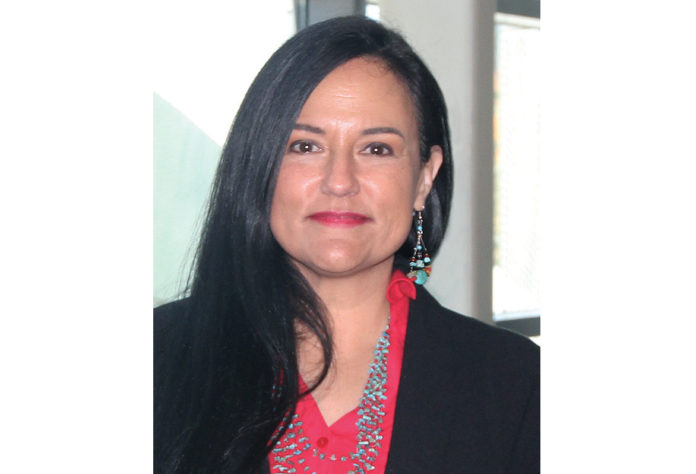Jeannie Hovland (Flandreau Santee Sioux) is Vice Chair of the National Indian Gaming Commission (NIGC), overseeing the integrity of over 500 Indian gaming facilities across 29 states. Prior to joining NIGC, Hovland served in various significant roles, including as Commissioner of the Administration for Native Americans, where she managed a $57 million annual budget, and as Deputy Assistant Secretary for Native American Affairs at the Administration for Children and Families. Hovland’s extensive background in Indian Affairs includes years of service in South Dakota, where she contributed to key legislation such as the Tribal Law and Order Act and the Code Talkers Recognition Act of 2008. We had the opportunity to meet with her at the recent Indian Gaming Tradeshow & Convention in Anaheim, CA. Here is what she had to say…
With former Chairman Simermeyer’s recent departure at the NIGC, what authorities have been transitioned to you to avoid disruption of the agency’s responsibilities and day-to-day operations?
Prior to the Chairman’s departure, he delegated the authorities allowed by Congress, and the commission staffing authorities were delegated to me as Vice Chair. I’m not Acting Chair, however, I do have delegated authorities to ensure that we are able to continue to hire supervised staff and address any procurement services or items. There has been no interruption – we have continued operations with business as usual.
What are the primary issues you foresee affecting tribal gaming operations in the coming years?
The continued negotiation of compacts in the states, with jurisdictional issues playing a part in that also. In the gaming world, I would say artificial intelligence, sports betting, and online gaming are changing the landscape. It’s crucial to keep up with technology and trends and work with the NIGC as we look for flexibility to support those changes.
What skills will the next generation of gaming regulators need to ensure sustainability in the Indian gaming industry?
They will need to know the Indian Gaming Regulatory Act, NIGC regulations, as well as their own ordinances, because tribes are the primary regulators of their gaming operations. Regulators will need to ensure that they are protecting their tribe, tribal enterprises, and ensure that gaming revenues are going back to the tribe and being used for purposes outlined by Congress. That is very important. In addition to that, with AI, sports betting and online gaming, it’s important for regulators to become experts in technology, and to work with the NIGC and our regulations to support technology trends. I really believe that is key for the next generation of regulators.
What role does preparedness play in encouraging consistent gaming operations and how are NIGC’s regulations supporting these efforts?
There are a number of aspects to this. Part of it is learning what the new technologies are, including the consumer trends and demands, and the regulations to support them. The Indian Gaming Regulatory Act, as well as our regulations and gaming ordinances, outline that all facilities must be run in a manner that adequately protects the environment, as well as public health and safety; everything from the facility license notifications to the letter of attestation to support that the facility is environmentally safe and safe for the public. We provide training and the regulations to support that. Our strategic plan has prioritized preparedness, and that includes cybersecurity preparedness, which we provide training on – nationally and site-specific. Additionally, our Safety and Occupational Manager, Eddie Ilko, has really increased the visibility of the importance of preparedness – everything from man-made to weather-related disasters, pandemics, and combating human trafficking.
We are very busy providing training while collaborating with tribes – bringing in their first responders and local stakeholders to make sure that our training is a good start of the conversation, and that when we leave, they continue on and have a preparedness plan. It’s been a very productive last couple of years since our strategic plan prioritized preparedness.
How will the NIGC continue to evolve to meet the needs of tribes operating tribal gaming facilities?
We will continue to uphold the Indian Gaming Regulatory Act. In 2022 and 2023, we hosted some very robust consultations and looked at several of our regulations to ensure that we are keeping up with the evolution of gaming and tribes wanting to keep up with consumer trends. We will continue consulting with tribes through our outreach and meetings. When we have a full commission, of course, we will look at regulations that may need to be updated.
For more information about the National Indian Gaming Commission, visit www.nigc.gov.














































